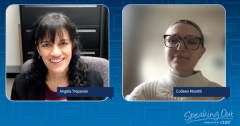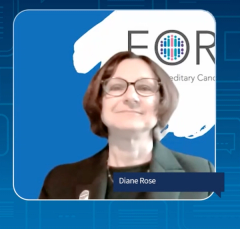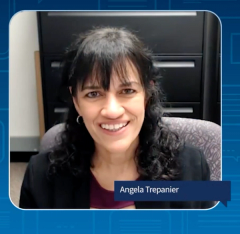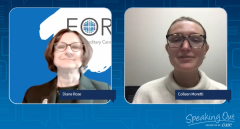
What Patients and Their Families Should Know About Hereditary Breast Cancer
As a part of its “Speaking Out” video series, CURE® spoke with genetic counselor, Angela Trepanier, on behalf of FORCE, to grasp a better understanding of what genetic breast cancer is and what it means for patients and their families.
Episodes in this series
Transcription:
Colleen Moretti: What is hereditary breast cancer and genetic testing? What does it mean for patients and their families?
Angela Trepanier: What a lot of people don't realize is that all cancer is genetic and hereditary cancer is just a form of genetic cancer. So all cancer is genetic and what I mean by that is that all cancer develops because of changes in genes that we have in our body naturally that are altered so that they don't work the way they're supposed to anymore. And that leads to a set of cells growing out of control and potentially growing and going into other parts of our body and that's what cancer is. In most of the cases of cancer, those genetic changes that cause cancer to develop are acquired, meaning that a person is born with typically working copies of those genes but just by chance or due to environmental exposures changes happen that lead to cancer developing. But in people who have hereditary cancer, one gene change is inherited — it's passed on from one of the parents, and it's present in all the cells of the body. And having that single gene change then increases a person's chance of developing cancer. In what cancers that are at increased risk of developing really depends on what gene is involved. But one important thing to remember when somebody does have a hereditary cancer risk, that doesn't mean they're 100% going to develop cancer. There is an increased chance, but it's never 100%. So it just means that there's an increased chance and that gives us an opportunity if we identify it to intervene and reduce the chance of developing cancer.
Moretti: Although the idea of cancer and treatment might not be new to a family who has already experienced it — a genetic risk may be. What are some of the terms and processes they should be aware of?
Trepanier: I think one of the very confusing things right now is that there is genetic testing that is done on tumor tissue samples to help with understanding what type of therapy they give a person. And then the hereditary cancer that we're talking about is a germline genetic testing, and that's usually taking a blood sample, or a cheek swab — so something that will look at those genes that are present in every cell of the body, to look for that inherited change. So not all the changes that cause the cancer to develop, but just that inherited change. So that can be confusing because sometimes somebody will have had the other type of tumor tissue testing in think that they had hereditary cancer testing, when in fact they didn't. Or somebody will think when they've had germline genetic testing for hereditary cancer, that that means there's a cancer present in their body and that's not what that means either. So that's one confusing part.
And then another confusing part is the fact that like I already said before, that when somebody has an inherited change, that it doesn't mean that they have a cancer or definitely will develop a cancer, other genetic changes still have to happen. So just recognizing it's a risk factor and not a certainty.
And then I think the other thing is that when somebody is offered an option to see someone about hereditary cancer, counseling and testing, they're often referred to a genetic counselor and a lot of people have never heard of a genetic counselor before. And a genetic counselor is somebody who's trained with a master's degree in genetic counseling. And that's a specialty where people go to training for two years, they do lots of clinical training, they take a certification exam, in some states they're licensed. And so they are experts in doing genetic risk assessment, understanding genetic testing, and then also providing support to people who are getting some sort of genetic diagnosis. So just though if you get referred to a genetic counselor, it doesn't mean that you're having therapy. It is a healthcare professional who's helping assess your genetic risk and then help you deal with the information that you get from that. But when you also are referred for genetic counseling, sometimes it's with a different health care provider — it might be a physician, it might be a nurse with training in genetics, it might be a physician assistant. So genetic counseling comes in many forms.
Moretti: What are some laws and privacy policies that protect those who do have an increased risk of cancer due to genetics?
Trepanier: There are some federal laws, so the US laws and then there are a lot of state laws, kind of a patchwork of laws that protect people from what we call genetic discrimination. And that is the act of denying somebody insurance or employment based on their genetic makeup. And federal the federal law that was passed in 2008 is the Genetic Information Non- Discrimination Act, and that law prevents insurers from denying somebody insurance, health insurance, and from denying them employment or advancement in their employment simply based on a genetic test result in somebody who themselves is currently healthy. And that was a really important law that took many years to pass, but it provides some protection especially to people in insurance plans that have 15 or more people.
And then each state has its own sort of privacy law or genetic nondiscrimination laws. Most of them are focused on health care and employment. There are a small set of states that might also have protections for life insurance and long-term disability care. But most of these laws do not cover that type of insurance. But it's really important to be informed about what kind of protections are available when you're considering genetic testing and a genetic counselor can help you navigate that information.
Moretti: What kind of resources cancer FORCE provide patients and their families when it comes to genetic counseling and hereditary cancer?
Trepanier: FORCE has so many amazing resources to help families understand the terminology. So, they go into a lot more detail than I did about what is hereditary cancer, What is genetic testing, what are some of the things you should think about? How do you have conversations with your family members? If somebody has inherited cancer, mutation or change it's really important that their family members are notified so that they can use that information for their own health. How do you reach out to them?
FORCE is this also your partner in terms of being a community of people who understand what it feels like to be at risk or to have in the new year to change. So there's a lot of other people who are in the same position who can help support someone through their journey. FORCE is also a great advocate. FORCE does a lot of education for providers, helping them recognize people at increased risk and it helps people recognize when they should be asking for genetic services so they can advocate for themselves. And FORCE also works with legislators to help pass laws that will help people with hereditary cancer, get the services that they need. So all of those resources are on the story on the FORCE website and there are a lot of people that you can reach out to that can help you if you're in the situation where you find yourself at risk.
This transcription has been edited for clarity.








